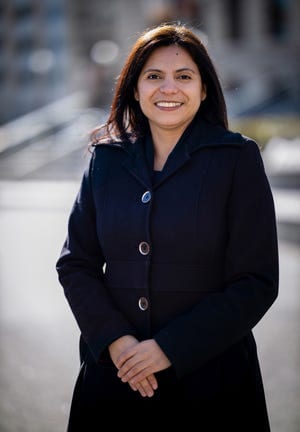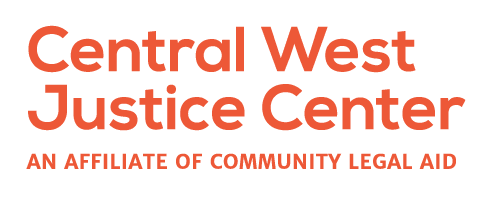
March 22, 2021
Last Call with Gina Plata-Nino, Community Legal Aid Attorney
Gina Plata-Nino is a key leader within the Worcester Together Coalition, in addition to her full-time role as a Community Legal Aid attorney.
Are you from the area?
No, I’m actually a transplant. I grew up in New Jersey and moved here around 2007.
Can you describe your career trajectory?
I moved here because I went to grad school in Boston and after that, I went to law school. I worked in Boston for a while, but the commute was hard and I began to appreciate the opportunities right here. I’ve been with Central West Justice Center of Community Legal Aid since 2016.
What are some of the issues you are most passionate about right now that intersect with your work?
My expertise is food insecurity. I’m sure you’ve heard about the Worcester Together Coalition. We’re a group of folks who have just been working with the city, trying to figure out how we can support our community during the pandemic. As a result of that, we created various groups to meet the needs of the community. One of those was a housing group and a food security group. They’re connected if you think about it because people don’t choose to be food insecure; it’s usually because you have high housing costs or high childcare costs. I’m happy to co-chair both groups and try to figure out what private and public agencies have the best resources to share.
What reliable resources have you tapped throughout the pandemic?
One of the things that I think we’re most proud of in this city is just the amazing sense of collaboration. We wanted to make sure no one was working in a silo because there are limited resources and we didn’t want multiple organizations duplicating the same thing. We spoke to the Family Resource Center and they agreed to be our hub of information. When someone calls experiencing need, they can provide a holistic approach. Many of my clients would previously tell me, “You’re the seventh person I’ve called today for a different service.” Now, they can go to a one-stop-shop through the Family Resource Center and get referrals, including my own agency, for any particular need. Having an organization in our community to disseminate and establish internal referrals is one of our greatest accomplishments. For example, having constant communication between agencies like Central Mass Housing Alliance and Worcester Community Action Council for fuel assistance — information sharing is so needed right now. We’re partnering with food pantries and doing PSA’s so the community has the right information.
If people want to get involved or take advantage of your services, where should they go?
Tim Garvin, CEO of the United Way, leads the main group. We meet every Thursday in the morning and report out from particular committees. Anyone who is interested in helping and has resources is welcome to join us. The best way to get in touch is either to email Tim or myself. If people are in need of resources, we refer them to the Family Resource Center.
How did you decide what type of law you wanted to practice?
I have a very different career than most folks. After I graduated law school, I did a clerkship with the Massachusetts Appeals Court, and then I had gotten another federal clerkship with a gap in between. I thought, at that time, I was going to do corporate international practice. I ended up leaving the U.S. and working as a legal consultant in Southeast Asia at a corporate firm, helping businesses establish themselves. After working over there where things are very different, I saw the need, the high poverty, and the lack of systems. I realized that I was really interested in making nonprofits more sustainable. When I came back to the U.S., I looked for a position that met my new priorities. There was an opportunity to manage the Food Security Project, which was a new initiative with the Worcester County Food Bank. They just said, “Create a program that will tackle food insecurity in Worcester.” I took it upon myself. I utilized SNAP, the federal Supplemental Nutrition Assistance Program. But, I also took a more holistic approach by asking, “What are the root causes of hunger?” There was a lack of housing security, high childcare costs, and a lack of minimum wages. We asked, “What else are those things affecting? How come people don’t have access to certain resources and others do?” We thought about language, access and disability. We talked about what systemic issues needed to be tackled. And so, I’ve been managing this program now since 2016 and growing it every year to include more partnerships.
I know you also did quite a bit of work helping people relocate after Hurricane Maria. Do you have any success stories that you could share?
I would say that the Worcester Together Coalition came as a result of that. There were a couple of us who worked really hard and we had lessons to learn. When COVID was around the corner we said, “I think we should get together.” We had already identified the needs — housing, food, education, and a safety net of sorts. Our greatest successes would be the collaboration and knowing the key partners who can help advocate and bring forth people with decision-making power to the table.
What do you have in the works for the future?
One of the things we focused on has always been sustainability and giving people power of choice and dignity to utilize their own resources and to purchase the food that they want. We’re actually pushing legislation to bring a law to allow people who are elderly or are homeless or who have a disability to be able to utilize their SNAP cards at participating restaurants to purchase hot meals. We’re really excited about that because you have other states like California that have been doing it for over 15 years. We’re hoping to do something very similar here as well, which I think is important because we see many of our elders who are shut-in or maybe just want a hot meal. For them to be able to purchase things or order things from a restaurant makes a difference. The other piece of legislation we’re working on is a result of the Department of Transitional Assistance office relocating and creating, not only a loss of jobs downtown but also a lack of access for our most vulnerable population by moving to Southwest Cutoff. If you don’t have a car, four or five miles makes a world of a difference. Before, it was a 20-minute walk, now it’s a two-hour bus ride. Thankfully we have great leadership in Representative (Mary S.) Keefe and Senator (Michael O.) Moore who are helping us file legislation to make sure that anytime these sort of agencies want to move, they need to talk to the community and notify them to ask for their feedback.
